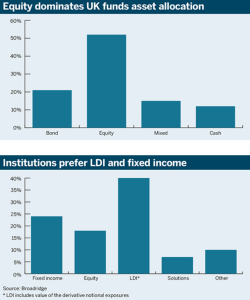
Today we see the launch of the Government’s new industrial strategy. Five Live’s “Wake up to Money” program came from the white heat of a Coventry industrial research plant. Last week Nigel Wilson called for us to put back the Capital into Capitalism and that same (budget) afternoon, Phillip Hammond name checked the “Patient Capital” project that is designed to do just that.
So it’s sad to hear that Aviva, one of the great sources of capital for British industry, is choosing not to invest in British productivity but to buy back shares and boost its share price. This can’t be seen as a productive use of capital, the parable of the talents bemoans this kind of behaviour and so does Aviva Investors (share buybacks short-term pain, long-term gain).
With earnings hard to come by in a low-growth world, … companies offering sustainable revenue and earnings growth, rather than short-term fixes like share buybacks, are likely to be rewarded.
Rewarding investors for taking a long-term view and not a quick return on investment is at heart of a good industrial strategy. I’m not good with these kind of words so I’ll continue to quote from Aviva Investor’s market briefing.
Whilst companies will likely continue to generate significant amounts of cash and debt markets will remain accessible, it is questionable how much longer this buyback boom can continue. Long term investors, in particular, want to see firm evidence capital is being used productively.
Here’s the conclusion.
To generate sustainable long-term growth, companies need to focus on re-investing further in their own businesses
and the threat to management who put pandering to short term shareholder interest before the long-term interests of the business.
Ultimately it is up to long-term shareholders, as stewards of capital, to demand companies allocate capital in the most efficient way.
I hope Aviva’s Mark Wilson (no relation) has access to his own company’s websites!
As with pensionsInvesting rather than speculating) in equities demands a long-term view. You are expecting to be rewarded for being patient. This is why John Ralfe points out that equities are not a risk-free source of return; the risk is that in the short-term you need your capital back and lose out.
But that does not mean you should not invest for the long-term; that is what our great pension funds like British Steel and the University Superannuation Scheme have historically done and that is why they successfully pay pensions to hundreds of thousands of people.
Ordinary people investing in DC are still invested in equity based funds; but recently, we’ve seen a shift from equities to bonds among institutional investors.

Like the insurance companies, our pension funds have been a long-term source of “patient capital“. It seems no coincidence to me that the drop in the productivity of the British Company has coincided with the fall in equity investment among British pension funds as LDI and other fixed income strategies are adopted.
The wholesale de-risking of our funded occupational DB plans from equities to bonds, often using complex derivative structures as part of “liability driven investment” has led to a decline in investable capital for the long-term. This has in turn led to a decline in long-term investment and is one of the reasons we are falling behind other OECD countries in our productivity.
Any industrial strategy needs to address not just the lack of investment but the reasons for the lack of investable capital. Nigel Wilson has put L&G’s money where his mouth is and invested shareholder funds in long-term investment projects with social purpose. Mark Wilson seems intent on handing back working capital to shareholders.
We are sitting on £300bn of cash in ISAs, “we” being British tax-payers (or in the case of ISAs – “non-tax-payers”). This is dead money that is simply sloshing round the system creating un-needed and unwanted liquidity. That money would be better put to productive use.
We want more Nigel and less Mark, more investment into real assets (equities and infrastructure) less into short=term holdings (cash and bonds). Activists, including Aviva Investors, should be pointing this out to management – including Aviva.
We want pension funds prepared to invest for the future. It is clear that many DB schemes are so far down the line in their de-risking programs that they may never be investors again. But that does not close the door on their opening again to future accrual, albeit accrual using equity investment to meet the long-term horizons that pension liabilities create. The FT reports that even the Bank of England are considering returning to investing in growth assets, a move that provoked this comment from Ros Altmann
“It effectively admits that the cost of providing pensions using only index-linked gilts may be too high and that the use of just these gilts may not deliver the most effective asset backing for the liabilities.”
It is opportune that in the week that we announce a new industrial strategy and days after a forward-thinking budget , the DWP Select Committee choose to open discussion again on CDC – what I like to call “target” (rather than guaranteed) pensions.
The essence of social capitalism is that we are all in this together. Nothing could be further from that truth than the self-invested personal pension. We need to isolate self-investment as the means of the special few and not shoe-horn SIPPs into the mainstream.
The mainstream investment is a collective , it’s how equity markets work – collective investment into publicly owned companies. Similarly it is how our pension schemes work. It is high-time we reasserted the importance of long-term investment and the vital risk-mitigation that comes from investors coming together to collectively define outcomes.
We do not restore confidence in pensions on our own – we do it together.
Rate this:Share this:





